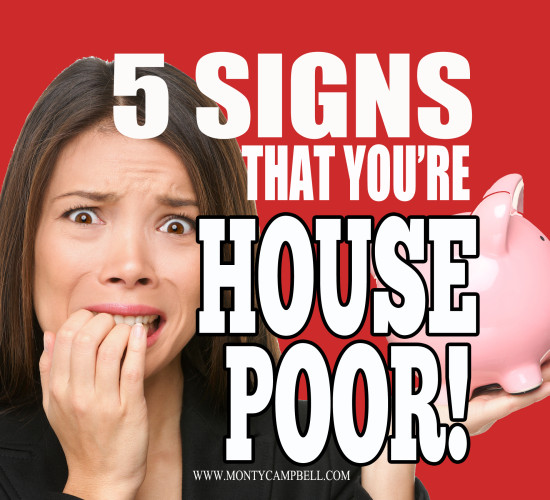Americans spend too much on housing costs.
There, I said it. And it needed to be said. It needed to be said because Americans, on average, spend over 45% of their income on their homes.
Pick up any personal finance book and the author will suggest that you should aim for 35%, which makes the 45% statistic even more alarming. I personally think 35% is too high. I think a good percentage of your income to spend on housing is 25%.
That’s because I see more middle-class families get into deep financial trouble simply by buying too much house. This one bad money decision sets off a chain reaction that buries them financially for years. When a person buys more house than they can afford, they tend to overspend on many associated things, in an effort to “match” the house:
-You can’t drive a perfectly fine older car and live in a $400,000 home, what would the neighbors think? So they go buy a brand-new expensive import car that “matches” the house.
-You can’t have inexpensive (but otherwise good) furniture in a $400,000 home, that’s not what people do in this neighborhood. So they go and buy truckloads of expensive furniture that “matches” the house.
And on and on. Until they spend themselves into trouble. Until they become house poor.
Being “house poor” is when you’re living paycheck to paycheck, not because you don’t have a better option, but because you choose a lifestyle that’s more expensive than the one you can actually afford. When you are house poor, so much of your monthly income is sucked up by your mortgage that you have to live in near-poverty in other aspects of your life just to keep your house.
The problem with house poverty is that becoming house poor doesn’t happen overnight. It happens sneakily over a few years and once a person realizes they are house poor, it’s too late.
That’s why I’ve listed several “house poor” signs below. These conditions are usually the tell-tale signal that someone has too much house on their hands:
1. Your Mortgage Payment Is 30% or More of Your Income
To be financially responsible, you should try to limit your mortgage payment to no more than 25 percent of your monthly income. You can probably get by with a little bit more than this, but you should draw the line at 30 percent. If your mortgage payment is 30 percent or more of your monthly income and you are not financially free, you need to start looking for a smaller home. Period.
2. You Are Putting off Routine Home Maintenance
If you find that you cannot afford to do small maintenance projects like painting your home, or installing a new dishwasher, then you are likely in a home that is too large for your budget. Even simple tasks like cleaning that needs to be done could seem unmanageable without assistance and the last thing you want to do is live in a home that is not cared for because of the costs attached to it.
3. Property Tax Increases Stress You Out
Property tax increases are a fact of life and can be expected year after year. If you are worried about these annual increases, and don’t feel like you will be able to make the payment with a jump in taxes, it’s time to let reality set in. As the cost of living increases every year, it’s important to budget for these things in advance to ensure you can remain comfortable in your home.
4. You Are Not Saving for Your Retirement
Most people who are living in homes that are too large for them see all of their other finances suffer. One of the most common victims of this budget crunch is their retirement savings. If your monthly bills are keeping you from investing in your retirement and you feel “house poor”, then looking into a smaller more affordable property is a wise decision.
5. You Are Making the Monthly Minimum Payments on Your Credit Cards
One of the first warning signs that people are in bad financial position is that they can only afford to make the minimum payments on their credit cards. If this debt gets out of control, it’s possible that you might start defaulting on your payments resulting in a worse position. If your home is part of the problem that is leading to this, be aware and take actions to correct the situation.
If any of these signs sound familiar, don’t ignore them. Being house poor is not where you want to be. Being house poor means a lack of freedom.
If you are looking to purchase a home, factor in maintenance costs, increases and your overall spending habits before making a commitment.
If you already have a home and you feel as if you just can’t keep up, contacting a local real estate agent to help you find a home that is more suitable and to help sell your current home is a wise choice.
It is far better to control your own destiny in a lower-stress environment in exchange for having one or two fewer bedrooms and a bit smaller kitchen.
In that situation, you have choices. You can choose to save for a nicer home down the road. You can choose to invest the extra money on hand to grow your net worth. You can choose to take the family on vacations more often and know that you’re not putting your budget in a precarious place.
When you’re faced with the decision about whether to buy or stay in an amazing house you can just barely afford or a less exciting house that you can easily afford, take your eyes off of the granite countertops for a moment and think about the freedom of choice in other aspects of your life.
Be free. Nothing else is worth it.
Ready for more tips on how to achieve the free life? Check-out more articles from the blog archives below:
Thirteen Simple Thoughts That Changed My Life Forever. How Will They Change Your Life?
Are You Giving Your All To Achieve Financial Freedom? Here’s What Happens When You Don’t.
The Little White Lie (You Know The One), That Keeps People Stuck In The Middle Class








